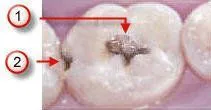There are many reasons why adult teeth may need restorative treatment. The most common reason is decay, followed by fractured teeth, and old restorations needing replacement. If we recommend that a tooth with a cavity be treated and more than a few weeks pass after the initial diagnosis, the cavity will almost always get bigger and can cause pain. Once this happens, it will likely require more extensive and expensive treatment. The tooth may even have to be removed and replaced with a false (or artificial) tooth. If you have a cavity and it needs a restoration, there are different kinds of materials that may be used to restore the functionality of the tooth. Please remember that a tooth may need treatment before it causes pain. If a tooth causes pain, it may be able to be saved, but the treatment time and cost typically increase due to the complexity of the necessary procedures.
How a Cavity Forms

Babies tend to get cavities on the front teeth, especially if they are given a bottle to sleep with. Even milk contains sugar that can harm teeth. This is referred to as baby bottle tooth decay. Children tend to get cavities on the chewing surfaces as well as in-between teeth. Adults can be at risk for both new and recurrent cavities.New cavities tend to form between teeth as well as on the root surfaces. The cavities that form between teeth are typically related to a lack of flossing. Cavities on the root surfaces of teeth generally occur because this area is not covered with enamel and is softer and more prone to cavities. The exposed root may be the result of hard brushing or bone loss related to gum disease. Cavities that reoccur form next to existing restorations such as fillings, crowns, bridges, etc. As restorations get old, the filling material can shrink or wear away, causing the possibility of a small space forming between the tooth and the restoration. This provides a prime area for bacteria to accumulate and breed decay. Click the link to do an experiment with fluoride to see how it helps fight cavities.
Cavities and Restoration Choices
As part of any visit to our office, we check all of your restorations such as crowns, fillings, bridges, veneers, etc. for any sign of decay or old age and we may recommend x-rays so that we can see inside and between your teeth. If we spot any cavities, we will recommend different options for restoring the tooth to full function. If the cavity is in the very early stages, we may decide to keep an eye on it and recommend a home fluoride rinse to help the tooth fight the cavity and possibly prevent the need for a restoration.




